
Roles
Interaction design
Visual design
Project management
Year
2020 - 2022
Client
University of Amsterdam
The average student in Amsterdam produces 27 kg of waste per year. 70% of the trash that is collected from the university campuses of UvA (Universiteit van Amsterdam) and HvA (Hogeschool van Amsterdam) comes from outside sources, meaning the waste is not originated in the campus, rather it is brought into the campus by all campus users such as students, staff, and guests. Most of this waste consists of food and beverage packaging. It appears like the users buy food and beverages from outside of the campus, like nearby supermarkets, or cafes, and dispose of their waste in campus facilities.
Consistent sustainability relies heavily on people's ability to turn short-term behavioural change into long-term habits. There are two modes when conceptualising habit shifting - nudges (subtle changes in communication) and friction (making conventional choices less desirable).
We discovered multiple intervention strategies, such as making sustainability convenient, giving enough information (eg., reasons for performing a specific behaviour), giving feedback, or offering incentives.
Four pillars
The app is built on four pillars - gamification, transparent information, feedback, and reminders.
Students can earn points for each sustainable challenge, and exchange them for tangible rewards from our partners.
Each challenge has a description explaining how exactly it helps the environment.
The users are being encouraged with positive feedback throughout the entire app.
The app sends a notification right before the challenge starts, so users don't forget about it.












